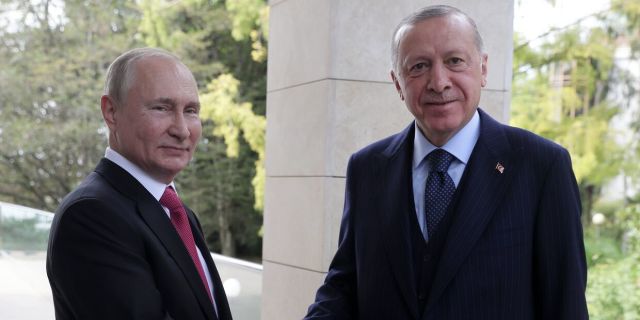Erdogan is playing a risky double game
Recep Tayyip Erdogan is playing a dangerous double game, establishing relations with Russia while his Western partners are doing exactly the opposite. The authors of the article in the Financial Times believe that the Turkish leader should behave carefully when playing this political poker.
Turkish president develops cooperation with Moscow, but may face American retaliation
Editorial article
The Russian military operation in Ukraine gave Turkish President Recep Tayyip Erdogan the opportunity to play the statesman and political bigwigs. Erdogan deserves praise for the mediation between Kiev and Moscow, thanks to which grain supplies from Ukrainian ports were resumed. But he carefully preserves and protects important economic ties with Moscow. After last Friday's four-hour meeting with Russian President Vladimir Putin, which seemed very friendly, Western capitals became worried, believing that Erdogan was deepening ties with Russia, while his NATO partners were doing the exact opposite, and that the Kremlin was looking for ways to circumvent Western sanctions. The Turkish leader is playing a difficult but risky game.
Erdogan has an uneven relationship with Putin, who is also a dictator and a geopolitical rival of Turkey. First of all, they have different priorities in the Syrian conflict. Ankara supplies Bayraktar attack drones to the Ukrainian army, risking incurring the wrath of Moscow. At the same time, Turkey, unlike the US and the EU, has not imposed sanctions, continues to buy Russian oil and gas as usual, and also does not close its airspace to Russian commercial airlines. She really wants to attract as many tourists from Russia as possible, who bring large profits to the Turkish tourism industry. In 2015, she completely lost them when she shot down a Russian combat aircraft in the sky over Syria.
It is unclear what exactly Erdogan and Putin agreed on in Sochi. The joint statement talks about the development of trade and energy ties, deepening cooperation in such sectors as transport, industry, finance and construction. The Russian Deputy Prime Minister said that Turkey will partially pay for gas supplies in rubles.
Later, the Turkish president said that five Turkish banks would accept Russian Mir payment cards. This is a big plus for Russian tourists visiting Turkey, because Visa and Mastercard have stopped working in Russia. Western capitals are concerned that the Mir payment system will be used to circumvent sanctions. However, there is no evidence that Erdogan agreed to the alleged Russian proposals in order to deepen banking and energy cooperation, which will help Moscow evade Western restrictions. The leak of this information was organized by Ukrainian intelligence.
Erdogan has good reasons to lure Russian capital, since he faces re-elections next year, and the country is experiencing a growing debt and currency crisis caused mainly by his own mistakes in economic management. Inflation in Turkey broke the record of 24 years ago, amounting to 79.6% in July, and the lira has depreciated by half against the dollar in 12 months. Although Turkey is a member of NATO, it is not legally obliged to impose American and European sanctions against Russia.
But deepening economic ties with Moscow will certainly increase friction with the West, and Ankara is already delaying the issue of Sweden and Finland joining the North Atlantic Alliance. Erdogan's position will also be a test for the West's ability to expand the geographical scope of sanctions. If sanctions start to fail because of Turkey, it will be much more difficult for the West to keep other emerging markets in check, say, Chinese. Beijing is still very wary of helping Russia.
One senior official suggested that Western countries could call on companies and banks to leave Turkey if Erdogan implements the plans he hinted at on Friday. But his country is simply too important geopolitically and for Western business. Europe is worried that Ankara may send 3.7 million refugees from Syria and other countries who are currently in Turkey to the continent.
Nevertheless, the United States has previously imposed punitive measures against Turkey, for example, when it purchased Russian air defense systems. In addition, Ankara may face secondary sanctions. They will need to be carefully verified in order to avoid a negative reaction within the country, which Erdogan can take advantage of. But these measures are still capable of causing damage that will negate all the benefits of cooperation with Moscow. When playing strategic poker, Erdogan should be careful not to overestimate his own capabilities.

